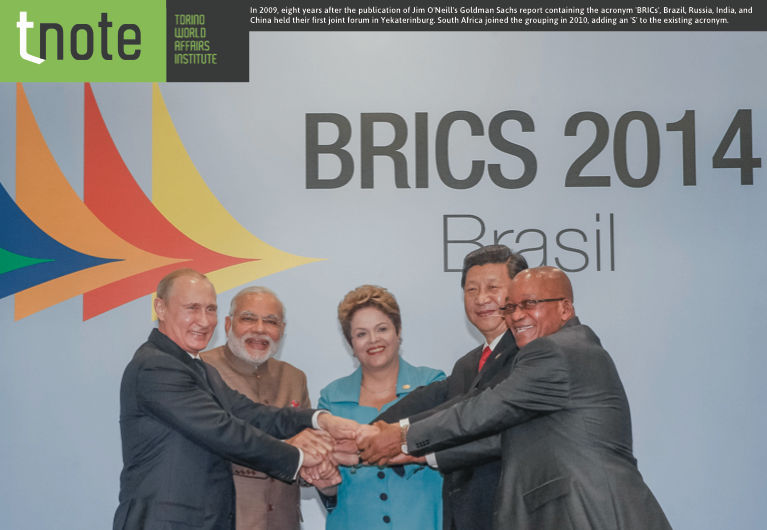
Events and phenomena materializing in world politics can be, and indeed have been, conceived as game changers. The widely read US National Intelligence Council report “Global trends 2030: Alternative futures” lists a few crucial developments, suggesting that different scenarios may ensue from their individual or combined impact. The list includes game-changing events such as the shifting role of the United States in international relations, the potential for increased conflict, and the influence of technological breakthroughs on global society.
Can words act as game changers too? Looking at the recent past, at least two instances support the conclusion that, yes, words can be game changers.
In spite of the fact that scholars still debate about the extent to which polarity offers a truthful depiction of the real world, most decision-makers, the media and public opinion in many countries—winners and losers alike—now assume that the international system is multipolar. There is little agreement on the new global players who may rightly be conceived as “poles” in this new, increasingly complex system, but most expect that world politics is anyway due to become more competitive with the passing of time.
Multipolarity—an apparently neutral word anticipating the dynamic of the redistribution of power within the post-1989 international system—can be conceived as a game changer in two respects: first, it fostered the recognition of emerging powers as global players and, second, it established “power” as a key variable to explain changing world politics. Change within continuity, one could say. If world politics becomes more competitive in the coming years, multipolarity will (unfortunately) have acted as a game changer in this respect, too.
Another word that appears to have “made things happen” is BRICs, the brilliant acronym coined by Jim O’Neill in 2001. A few years later, Brazil, Russia, India and China, soon joined by South Africa, started holding formal meetings and, to some extent, coordinating their actions. The creation in 2014 of the New Development Bank (NDB), better known as the BRICS Development Bank, was a major achievement unveiling—in the eyes of many observers—greater group cohesion. An increasingly relevant non-state actor in world politics may thus be seen as the result of successful wording in a Goldman Sachs report.
Of course, potential game-changing words may fail to deliver: looking back to the last few years at least two unsuccessful discursive game changers come to mind. One is “Arab Spring” and the other is the “Fourth wave of democratization.” Framing the uprisings in the MENA region as part of a movement could discursively support their success by generating a sort of “momentum effect”, but such auspicious images clearly did not materialize, as the outcomes of this turbulent process differ greatly from country to country.
If words can act as game changers—producing change or failing to do so—, we should examine closely what goes on where discourse is created and made to circulate: academia, private and public think tanks, governments. After all, we attach meaning to facts through words and scrutinising the language of world politics may help us detect the emergence of certain phenomena before we can actually observe them unfold. It is an anticipatory capacity quite relevant for decision-makers too, who may then timely decide whether to support, try to steer, or resist certain developments as they take shape.
Multipolarity and BRICS are likely to continue affecting world politics in the coming years, but more time may be necessary to fully assess their impact on international relations. For the time being, they are part of the world as we experience it every day. Observing this world, can we spot new discursive game changers?
A good candidate for the role, today, is the notion of ‘Concert’. The label takes us back to the Congress of Vienna, held at a time—the early nineteenth century—when multilateralism had yet to become the foundation of an institutionalised order producing governance through an ever more complex and established network of international organisations in most political domains. Concert meant moving forward with respect to traditional conference diplomacy, entrusting great powers with the special responsibility of collectively managing common problems. Concert may turn out to be a discursive game changer for the very reason that it builds on the image of a multipolar world to stress the component of responsibility that lies with great powers: a responsibility that entails a corresponding power to decide and act. So much so that China, sensitive to the issue of sovereign equality as it is, has suggested ‘major powers’ as an alternative wording to avoid at least the more disquieting effect that may result from pulling this term out of the closet.
Therefore, in what ways should we expect the notion of Concert to influence the course of world politics? Being associated with a realist conception of international relations, it may suggest that the tools governments are bound to use, from now on, are those required by an anarchic world. No wonder a lively debate on the relevance of realism is currently in progress in the US, as scholars and policymakers reflect on the Grand Strategy of the United States after Obama. No wonder China is re-interpreting the demanding role of responsible stakeholder of the international order by presenting itself rather as a “benevolent hegemon”, ready to provide the world with a new public good: the Silk Road Economic Belt. To put it boldly, if words do act as game changers, the notion of Concert may have unintendedly paradoxical consequences on world politics: instead of fostering a different, more effective joint management of common problems in troubled times, it could shape a world where old-style power has a new centrality and joint action becomes more difficult.
What is most striking, however, is that real or potential discursive game changers today come from the old language of international relations. No wonder change turns out to be an endless “back to the future” experience. If we want to move forward, new words are needed.
Download


Copyright © 2025. Torino World Affairs Institute All rights reserved
